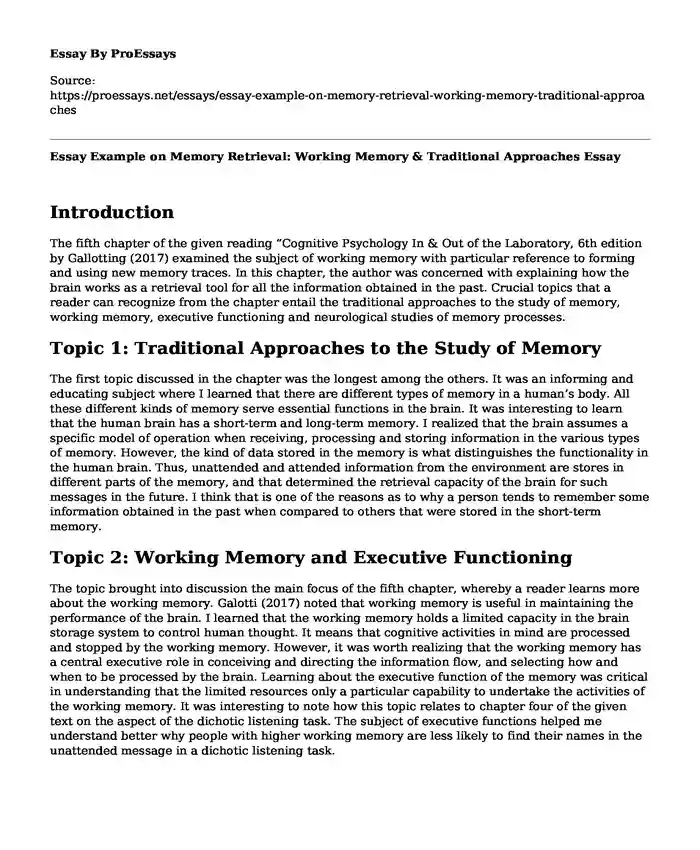Introduction
The fifth chapter of the given reading “Cognitive Psychology In & Out of the Laboratory, 6th edition by Gallotting (2017) examined the subject of working memory with particular reference to forming and using new memory traces. In this chapter, the author was concerned with explaining how the brain works as a retrieval tool for all the information obtained in the past. Crucial topics that a reader can recognize from the chapter entail the traditional approaches to the study of memory, working memory, executive functioning and neurological studies of memory processes.
Topic 1: Traditional Approaches to the Study of Memory
The first topic discussed in the chapter was the longest among the others. It was an informing and educating subject where I learned that there are different types of memory in a human’s body. All these different kinds of memory serve essential functions in the brain. It was interesting to learn that the human brain has a short-term and long-term memory. I realized that the brain assumes a specific model of operation when receiving, processing and storing information in the various types of memory. However, the kind of data stored in the memory is what distinguishes the functionality in the human brain. Thus, unattended and attended information from the environment are stores in different parts of the memory, and that determined the retrieval capacity of the brain for such messages in the future. I think that is one of the reasons as to why a person tends to remember some information obtained in the past when compared to others that were stored in the short-term memory.
Topic 2: Working Memory and Executive Functioning
The topic brought into discussion the main focus of the fifth chapter, whereby a reader learns more about the working memory. Galotti (2017) noted that working memory is useful in maintaining the performance of the brain. I learned that the working memory holds a limited capacity in the brain storage system to control human thought. It means that cognitive activities in mind are processed and stopped by the working memory. However, it was worth realizing that the working memory has a central executive role in conceiving and directing the information flow, and selecting how and when to be processed by the brain. Learning about the executive function of the memory was critical in understanding that the limited resources only a particular capability to undertake the activities of the working memory. It was interesting to note how this topic relates to chapter four of the given text on the aspect of the dichotic listening task. The subject of executive functions helped me understand better why people with higher working memory are less likely to find their names in the unattended message in a dichotic listening task.
Topic 3: Neurological Studies of Memory Processes
The third topic in the fifth chapter was neurological studies of memory processes, whereby I learned that the components of the brain are similar to neural "filing cabinet" whereby the information memory traces are stored. This subject was impressive on how the brain was related to neurological studies. I realized that the picture of the working memory learned from the neurological studies is different and more complicated when compared to the traditional approaches to memory. One aspect that stood out in this topic was that memories are not all stored in a single place. Classical conditioning of motor responses determined the acquisition and storage of information in the working memory. I think this topic is useful for cognitive psychologists in realizing the need to examine the working memory processes to understand the motor responses and how they can impair the auditory recognition memory.
Conclusion
In conclusion, the fifth chapter was an informing section of the given reading. It provides a reader with an in-depth understanding of the memory processes and how they relate to neurology. Learning about sensory and short-term memory was significant for me as a student in the cognitive psychology field. The working memory was the centre of the discussion that brought the chapter’s goals into a more detailed way. Relating the memory processes to neurological studies was a successful way of learning about the functionality of the brain.
Reference
Galotti, K. (2017). Cognitive psychology in and out of the laboratory. 6th Edition. Sage Publications, Inc. ISBN13: 9781506351568
Cite this page
Essay Example on Memory Retrieval: Working Memory & Traditional Approaches. (2023, Sep 11). Retrieved from https://proessays.net/essays/essay-example-on-memory-retrieval-working-memory-traditional-approaches
If you are the original author of this essay and no longer wish to have it published on the ProEssays website, please click below to request its removal:
- Acute Social Anxiety Disorder
- Essay Sample on Being Unique in a World of Clones
- Long Term Romantic Relationship - Essay Sample
- Adolescent Eating Disorders: The Impact of Social Media - Essay Sample
- Essay Example on Enhancing Skills & Productivity Through Training & Learning
- Paper Example on Stress & Its Consequences: The SRRS & GAS
- Essay Example on Motor Learning: Information Processing Critical for Success







